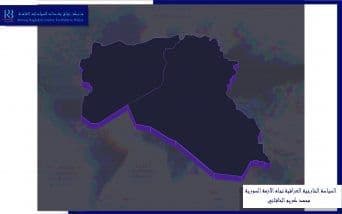 2020 / 24 / Nov
2020 / 24 / Nov
Iraqi foreign policy towards the Syrian crisis
Muhammad Karim Al-Khakani. Academic and researcher in political affairs.
The foreign policy of any country stems from the requirements of achieving its supreme national interests, taking into account not to transgress in one way or another the established rules in regulating the relations of states with each other, and foreign policy depends on what is produced by its internal environment, i. It is like goals and behaviors. While another sees it as “a methodology for action or a set of rules or both, chosen to deal with a specific problem or incident that actually occurs or occurs currently, or is expected to occur in the future”, and therefore foreign policy represents an extension of the internal policy of the state, and followers differ in defining the principles and goals of Iraqi foreign policy after the change of the previous regime in April 2003, and in any of the successive governments its features became clear in the face of regional and international changes, it can be said that it is affected by See the external decision maker.
The nature of the relationship between Iraq and neighboring Syria is based on the vulnerability of the security variable and its repercussions, as well as the international influence represented by the United States of America and the regional influence of neighboring countries, especially Iran. The politician who ruled for many decades, which withdrew from the most important event in his foreign policy and its transition from the circle of centralization and monopoly of power to the restructuring of state institutions, the establishment of a legislative authority, an elected government, an independent judiciary, and the plurality of influential centers of power in the political arena, represented by a marked increase in the activity of political parties, community elites, civil organizations, political activists, and other political activities that undoubtedly contributed to achieving political participation, so the Iraqi state found itself facing a set of challenges, whether external or internal, and Syria was feeling a number of fears Regarding the change in Iraq, the United States of America had a major role in the process of change, and Damascus rejected the American war on Iraq, and therefore the first phase of the Iraqi-Syrian relations witnessed a deterioration despite the exchange of visits between officials of the two countries, and this is due to Iraq’s preoccupation with the security file and the faltering of its foreign policy, and therefore the results of that stage are frustrating and disappointing, and when comparing the conditions in Iraq and Syria, we will be facing several issues that the two countries share, such as the issue of borders, regional influence, the rule of the Baath Party in both countries, civil wars, and the fact that Iraq is a country Ur to Syria, as it suffers from the repercussions of the infiltration of terrorists on both sides of the border, and of course the relations between them were affected, as a result of the fundamental and inconsistent changes after 2003, the most prominent of which is the problem of refugees, especially Baathists and immigrants from Iraq to Syria.
The impact of these changes was reflected on the vision of Iraqi foreign policy towards Syria, as Iraq considered Syria to be one of the causes of the security deterioration that occurred in Iraq by supporting terrorism, and accordingly the Iraqi foreign policy was apprehensive of concern from the Syrian side, although there were attempts to end that file and open a new page of relations, but the factor of mistrust and uncertainty in the positions contributed to the non-resumption of their diplomatic relations, and this can be inferred by the statement of the former Iraqi Foreign Minister (Hoshyar Zebari) after Colin Powell's visit to Syria three months after the killing of the Prime Minister of Lebanon ( Rafik Hariri), that Syria is one of the main routes taken by terrorists.
And it relied on Syrian motives to intervene in the Iraqi foreign political affairs, through developments in the internal security situation, the direction of the new Iraqi political system, and the extent to which Syria evaluates the nature of its external interests that it seeks to achieve, the most important of which is preventing the establishment of a strong and stable Iraq and working to create chaos inside Iraq to prevent a threat to Syria's security.
1_ Carrying out a Syrian military intervention in Iraq, as Syria sought to achieve influence over the successive Iraqi governments, and to work to weaken them.
2_ Suya intervenes in Iraq to prevent further restrictions imposed by the United States of America on Syria in a way that threatens Syrian national security, as Syria considers this a threat to its strategic interests, so it tends to intervene in Iraq to show its importance in regional stability.
3_ Ensuring the strengthening of economic influence in Iraq through Syria's interest in reopening the oil pipeline, which extends from Kirkuk to the Syrian port of Baniyas, and activating trade exchange agreements between the two countries. Such a step would provide low-cost fuel, as well as an increase in expected revenues that could be included in the treasury of the Syrian state through transit fees.
Despite the long period of time since the occupation of Iraq in 2003 until the outbreak of the Syrian crisis in 2011, we can say that Iraq did not have a clear foreign policy towards Syria, so the most important variable in the vision of Iraqi foreign policy is how to deal with the Syrian crisis. Since its outbreak on March 15, 2011, Iraq has viewed developments in Syria with cautious anticipation, due to the geographical, political and security specificity with which it is linked. Iraq has a common border with Syria of about 650 km. This Iraqi caution towards the situation in Syria is due to two reasons:
First: The peaceful movement turned into armed violence months after the outbreak of the crisis in Syria.
The second: the sectarian war that Iraq has suffered from since the bombing of the shrine of the two imams al-Askari (PBUH) in Samarra in February 2006 and its repercussions on the Iraqi internal security situation.
The nature of the post-Arab movement imposed a shift in Iraq's foreign policy towards Syria, as the Iraqi foreign policy-maker looks at achieving national interests and believes that any change in Syria will endanger Iraqi national security, and therefore he refuses to change the Syrian regime by military means.
Iraq abstained from voting on most of the League of Arab States’ decisions issued regarding the Syrian crisis, such as the decision to suspend the participation of delegations of the Government of the Syrian Republic in the meetings of the League Council, as of November 16, 2011, and Iraq’s reservations about the Arab League Council’s decision on November 27, 2011, which included the imposition of economic sanctions on Syria, in addition to Iraq’s abstention from voting on the Doha Summit resolution on March 26, 2013, and Iraq voted on a resolution
The General Assembly of the United Nations under the auspices of the Arab League in February 2012 regarding the condemnation of violence in Syria and the call for a peaceful transfer of power in it.
Iraq always stresses in the course of its foreign policy that it stems from the priority of its national interests and in order to prevent the dangers that threaten the entire region due to the presence of terrorist groups, as Iraq is considered to be the country that fights terrorism on behalf of the entire world. With the rational and realistic approach, as well as Iraq's condemnation of the use of chemical weapons and all forms of human rights violations by both sides of the crisis, and Iraq's condemnation of terrorism and armed groups.
Therefore, Iraq mediates an important location in the region, in which international and regional strategies collide, so that it is still spinning in the vortex of political conflicts that contributed to defining the paths of relations and the expected spatial borders of Iraq in its regional environment, and therefore the paths of vulnerability and influence will be clear in determining the future paths for Iraqi international and regional relations in this regard .
Therefore, the content of Iraq's foreign policy after 2003 crystallizes in the embodiment of the principle of independence and the achievement of national interests, as Iraq aspires to practice an independent foreign policy far from any external pressures that are affected by the pressures of the turbulent and unstable regional environment due to the high intensity of regional and international conflict between the various active forces in the region. Which reflected positively on Iraqi diplomacy in the regional and international framework.

Muhammad Karim Al-Khakani Muhammad Karim Al-Khakani Muhammad Karim Al-Khakani